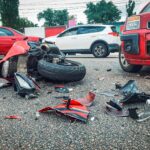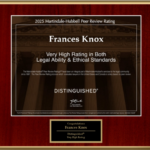Every year, thousands of lives are turned upside down by hit-and-run accidents. In North Carolina, the numbers are staggering. In 2020 alone, over 11,700 hit-and-run incidents were reported, resulting in 62 fatalities and more than 5,600 injuries. Each of these numbers represents a story of loss, pain, and unanswered questions.
A hit-and-run accident is defined as a situation where a driver involved in a collision leaves the scene without providing information or offering assistance. Under North Carolina General Statute § 20-166, this is not just irresponsible—it’s illegal. In this blog, we’ll explore the laws surrounding hit-and-run accidents, steps victims can take, and how Knox Law Center in Charlotte, NC, can help victims navigate the road to justice.
What North Carolina Law Says About Hit-and-Run Accidents
Legal Definition and Responsibilities
In North Carolina, the law is clear: drivers involved in an accident must stop immediately. Whether the collision results in property damage, injury, or loss of life, the obligation remains the same. Think of it as a moral and legal baton passed during the incident—failure to take responsibility disrupts the entire chain of justice.
Drivers are required to:
- Stop at the scene of the accident.
- Provide their name, address, and vehicle registration information.
- Offer reasonable assistance to injured parties.
- Remain until law enforcement arrives.
Criminal Penalties for Fleeing the Scene
The penalties for a hit-and-run in North Carolina vary depending on the severity of the incident.
- Misdemeanor Hit-and-Run: If the accident involves only property damage or minor injuries, the offender faces a Class 1 misdemeanor. This can lead to up to 120 days in jail and significant fines.
- Felony Hit-and-Run: For accidents resulting in serious injury or death, the charges escalate. A Class H felony can result in up to 25 months in prison, while a Class F felony for fatalities carries penalties of up to 41 months. License suspension and hefty fines often accompany these charges.
These consequences underscore the seriousness of leaving the scene and the state’s commitment to holding offenders accountable.
What to Do If You’re a Victim of a Hit-and-Run
Prioritize Safety and Health
Your immediate priority should always be your safety. Move to a secure location, if possible, and seek medical attention promptly. Even injuries that seem minor at first can become serious over time. Documenting your injuries early is crucial for building your case later.
Gather Evidence at the Scene
Evidence is the cornerstone of any hit-and-run case. While at the scene:
- Take photos of vehicle damage, skid marks, and your injuries.
- Write down or record the fleeing vehicle’s make, model, color, and license plate, if possible.
- Collect contact information from witnesses who may have seen the incident.
Think of this as assembling pieces of a puzzle. Each detail brings clarity to the overall picture.
Report the Incident to Law Enforcement
Filing a police report is essential. Law enforcement can document the event, investigate the offender, and provide a crucial record for insurance claims or legal actions. This official documentation ensures the event is treated with the seriousness it deserves.
Notify Your Insurance Company
Contact your insurance provider as soon as possible. In North Carolina, uninsured motorist (UM) coverage is designed to protect victims of hit-and-run accidents. While the claims process can sometimes feel like navigating a maze, having a clear police report and documented evidence can streamline the process.
Exploring Legal Options for Victims
Pursuing a Civil Lawsuit
If the hit-and-run driver is identified, victims have the right to file a civil lawsuit. Compensation can cover:
- Medical bills.
- Property damage.
- Lost wages.
- Emotional pain and suffering.
While no amount of money can undo the harm, financial recovery can help victims rebuild their lives.
Leveraging Uninsured Motorist Coverage
When the at-fault driver cannot be identified, uninsured motorist coverage can step in. This policy provision can cover medical expenses and property damage. However, insurance companies often attempt to minimize payouts, which is why having legal representation is invaluable.
Statute of Limitations and Legal Support
In North Carolina, the statute of limitations for filing a personal injury lawsuit is typically three years. Missing this deadline can jeopardize your case. An experienced attorney can ensure deadlines are met, evidence is collected, and your rights are protected throughout the process.
Challenges Victims Face in Hit-and-Run Cases
Identifying the Offender
One of the biggest hurdles is identifying the driver who fled the scene. Surveillance footage, witness statements, and forensic evidence, such as paint transfers, can all play a role in uncovering their identity.
Dealing with Uninsured Drivers
Even when the offender is identified, they may lack adequate insurance to cover the damages. In such cases, alternative compensation strategies need to be explored. This is where an attorney’s expertise becomes invaluable.
Emotional and Psychological Impact
The trauma of a hit-and-run accident extends beyond physical injuries. Victims often face anxiety, depression, and lingering fear. Recognizing the emotional toll and seeking professional mental health support is just as important as addressing physical injuries.
How Knox Law Center Supports Victims of Hit-and-Run Accidents
A Proven Track Record of Success
Knox Law Center has decades of experience representing victims of hit-and-run accidents in Charlotte and the surrounding areas. We’ve helped countless clients secure the compensation they deserve, ensuring their voices are heard in a system that often feels impersonal.
Personalized Advocacy
Every case is unique, and we tailor our approach to meet the specific needs of each client. From gathering evidence to negotiating with insurance companies, we handle the heavy lifting so you can focus on healing.
Comprehensive Legal Support
Our services extend beyond courtroom representation. We assist with evidence collection, insurance claims, and even connecting clients with medical and psychological resources. Knox Law Center is your partner in recovery, every step of the way.
Preventing Future Hit-and-Run Accidents
Raising Awareness About Legal Obligations
Education is key to prevention. Drivers must understand their legal and moral responsibilities to stop and assist in the event of an accident. Awareness campaigns can help reinforce these obligations.
Encouraging Witness Cooperation
Bystanders play a vital role in holding offenders accountable. Reporting incidents and providing witness statements can significantly impact the outcome of a case.
Advocating for Stronger Penalties
Stricter laws and penalties can deter would-be offenders, creating safer roads for everyone. By supporting legal reforms, communities can take a stand against hit-and-run behavior.
Hit-and-run accidents disrupt lives, but victims have avenues to seek justice and rebuild. Understanding the law, taking immediate action, and enlisting experienced legal support are critical steps. Located at 905 East 7th St., Charlotte, NC, Knox Law Center is just a half-mile from Independence Park, making it a convenient choice for local residents seeking justice.
If you or a loved one has been affected by a hit-and-run accident, don’t face the aftermath alone. Knox Law Center is committed to advocating for your rights, ensuring you receive the compensation and justice you deserve. Contact us today to take the first step toward recovery.






